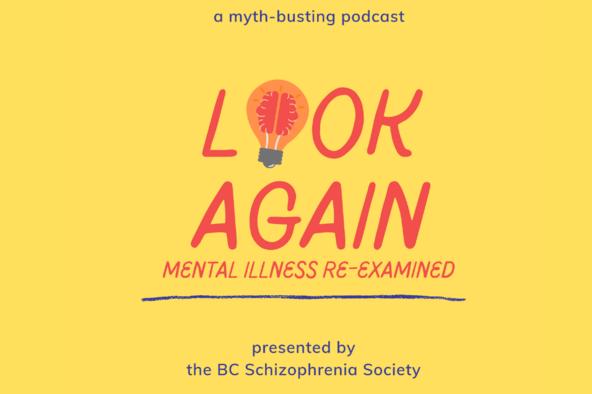BC Partners: BC Schizophrenia Society makes important topics accessible

The BC Schizophrenia Society (BCSS) is one organization taking advantage of online platforms. As part of its commitment to advancing mental health literacy across the province, BCSS is launching an eight-part podcast series entitled “Look Again: Mental Illness Re-Examined.” The series will educate people about the realities of mental illness, reduce stigma and unpack important topics such as the importance of hope, mental health versus mental illness, the impacts of COVID-19 on those with severe mental illnesses, and violence as a symptom of untreated schizophrenia.
Andrew Stewart, the director of operations and programs at the BC Schizophrenia Society, sees this podcast as a new avenue to reach people in all corners of the province, and beyond. “Part of building health literacy is finding new and dynamic ways to share information with expanding audiences, and we want to do this in a way that’s enjoyable. Podcasting enables us to educate without it being intimidating or overwhelming. People can tune in on demand, whenever and wherever they want – in the car, when out for a walk, even while cleaning the house. We’re excited to have found this medium that can live on, and be built upon.”
Each twenty-minute episode will feature clinical experts like psychiatrists, physicians and therapists, as well as people with lived and living experience and families of those with schizophrenia and other serious mental illnesses.
Leveraging the BC Partners for greater impact
The BC Partners is a coalition of seven nonprofit organizations that work together to activate knowledge for healthier individuals, families, and communities across British Columbia. It is funded and stewarded by BC Mental Health and Substance Use Services. The BC Partners have worked together on a number of initiatives and resources to date, including Visions Journal and the HeretoHelp website, and this podcast is the latest way they are building awareness of mental health and substance use disorders among British Columbians.
In order to maximize the impact of the podcast, Faydra Aldridge, the CEO of BCSS and podcast host, enlisted the help of the BC Partners right from the start.
“Since the beginning, the BC Partners and BC Mental Health and Substance Use Services have helped us identify podcast topics, potential experts and guests, and are supporting us with promotion,” she said. “It has been tremendously helpful to have their input, feedback and expertise.”
"Part of building health literacy is finding new and dynamic ways to share information with expanding audiences, and we want to do this in a way that’s enjoyable." - Faydra Aldridge
Faydra hopes that the podcast brings about a better understanding of serious mental illnesses. “My vision is to get to a point where we can talk about schizophrenia in the same light as other illnesses, like depression or anxiety. It’s not just the illness we need to talk about, it’s everything surrounding it – substance use, the social cost to individuals and family, the economic costs, and other implications like homelessness, for example.”
Deborah Ross, the provincial director of strategic initiatives at BC Mental Health and Substance Use Services, has seen the power of the BC Partners working together.
“We hear all the time that collaboration is the key to success. With the BC Partners, that has proven to be the case, time and again. We continue to see the unparalleled knowledge, passion and commitment of all seven partners to advance health literacy relating to mental health and substance use. The BC Partners are a group of organizations leading the way in care for people at risk for or impacted by mental health and/or substance use challenges and, by collaborating with BCMHSUS and each other, as well as their networks and communities, they leverage their collective wisdom for greater reach and impact of their work. This podcast is yet another example of that and we’re really excited about the potential of podcasts as yet another way to reach audiences in ways that are meaningful for them.”
Mental health VS. mental illness
Over the years, there has been great improvement in society’s understanding of disorders like depression and anxiety but the understanding of complex illnesses needs to catch up. In recent times, people started using the term ‘mental health’ to move away from stigmatizing language but now, we sometimes see conflations between COVID-19 anxiety or feeling ‘low’ in winter for example, and schizophrenia or other complex mental illnesses. This may create more stigma for those experiencing serious illness as focus is moved away from them and their needs. We can’t tell people with complex disorders to just exercise or change their diet. For these populations, treatment is more than managing mental well-being. Complex disorders need multifaceted care plans and if we don’t understand that, we see blame being put those with complex illnesses for not ‘taking care of themselves.’
Schizophrenia affects one in every 100 people and currently, there is no known cause. According to Faydra, “Schizophrenia doesn’t care who you are. It is no more prevalent in people from lower socio-economic backgrounds than anyone else. It can affect everyone — young people in the prime of their lives, people living very full lives. That’s why this podcast is so important. There is a need to build a better understanding of the illness and its impacts.”
Upcoming guests on the podcast include Dr. Nick Mathew, the medical director of complex mental health and substance use services.
The first episode airs on March 31 and will be available on Spotify, Apple Music, and on BCSS.org.